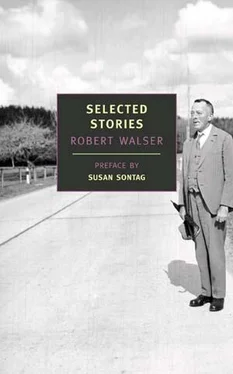If her hair was a fair match for her eyes, she also enjoyed the not particularly nice reputation of being a glutton, which could have been an insult, of such utterly unwarranted slightness that, living, moving, and standing as I do in my own epoch, I am most gratifyingly astonished by it.
During the time when, as is well known, the Russian general Gorchakov practically dominated the European scene, there existed with the upper and lower middle class, to set ladies’ maids’ fingers flying, corsets, or bodices. Everyone knows that Biedermeier women were laced to the utmost tightness when they went to their soirées.
The moment this housemaid, due to the prevailing servant hierarchy, received a blow on the head, she would say of the punishment that had been inflicted upon her, yes, insofar as she would smile politely, that is to say, with impertinent civility.
She worked in a nimble way, but her lover became, with more success than was welcome to his fellows, a criminal, who did with wondrous precision things I shall not mention.
While misdeed upon misdeed accrued to his credit, or, in slightly diffierent language, good prose pieces galore seemed to drop from his pen, his conduct toward the housemaid was so beneficial that she believed she was right to think of him as a man whose goodness had no bounds.
The maid, true, though this emphasis is only incidental, had a habit of eating Schabziger, as they call it, a variety of herb cheese. More and more difficult did it become for him to kiss her on the lips. He once took the risk of indicating disapproval thereof; she begrudged him this.
With a nobly casual air as befitted his rank as a war lord, General Gorchakov, who only comes into this sketch of mine for local color, commanded his armies.
Once the housemaid had performed her tasks, instead of going out for a walk, which certainly would have done her no harm, she went to her room, sat down at the table, and started to write.
If it was letters she wrote that reached her lover safely every time, perhaps the window was open and a sparrow, or chaffinch, would be fluttering on the sill.
All the songs of singing birds heard by people such a long, long time ago!
[1928–29]
IT was ideal, and the couple would think of it for a long time afterwards. He wore on his head a beret and she a voile de voyage floating in the wind that scudded over the blades of grass. The forest edge checked the wind. Firs waved and nodded, and good-naturedly oaks spread their limbs. “We hope with hearts as one,” he said. She looked at him, gratefully. In their rolling motor car they came into a sumptuous town with high-gabled houses glowing duskily. Among the splendid, exquisite buildings were blossoming gracious trees that seemed to bid the new arrivals welcome. On the windowsills flowerpots stood, and in the inn where the couple comfortably dismounted, for repast and repose, musicians were fluting, bag-piping, and trumpeting. The next day their journey took them across fields and through forests. Beside a sparkling brook, as it rippled along, they had a snug idyllic picnic in a setting of distant hills. Traveling on, they encountered a crackpot who, gaunt and very tall, in threadbare lackadaisical clothes, gave them a haughty look. “Bachelor!” said the bridegroom, suffused with love and devotion, to the stranger, “why do you look at us with such contempt?” The scornful smiler answered: “Because I am nagging and caviling at you, and only half believe in your happiness.” The bride shook her head, as if this man who doubted joy was beyond her comprehension. Soon the philosophical figure had disappeared from their sight. In time they came to a station, through which a train passed. Not far from there a friendly body of water spread itself, in a wreath of reeds. A swan was swimming on the calm, clear surface. From a bell tower on whose tip a cockerel shone golden in the sun, a clock announced the hour. A boy on stilts strutted past a table on whose top a pair of gloves was lying. A Gaul or Hun had a tobacco pipe in his mouth and was belaboring with a saw a piece of wood, using a sawing horse. For a time the eyes of the happy couple were attracted to a spindle. A hunter pursued a partridge, aided by a nimble and willing dog. Toward the swan, on the lake shore, a pig walked at a leisurely pace, grunting contentedly from time to time, aiming to cozy up to the noble creature. The ill-favored animal, which even then presented a sort of image of peerlessness, succeeded in coming up alongside. The swan, in its soft and elegant way, was willing to accommodate the eager pig in partnership. What a beautiful thing friendship can be! Yet many other sights were in store for them, a farmer plowing, for instance, and next to him a country manor of townlike appearance, over which a snail was strolling, on some errand or other, if to speak of a stroll can be justified here. A robed rider rode on his buoyant horse out of a suggestive thicket, evidently on a mission, and a piece of rope, or string, was lying on a bench. The bench was absorbed in the expectation of being sat on. To enumerate every concrete thing in the world would exhaust me, and the reader too, so I shall confine myself and wish the couple a safe return home and a cornucopia of delights on their life’s way. All around they looked, were interested in a variety of things, took careful note of some, including an elephant, a dove, and a snake. Capped with fluttering bannerets, and highbreasted, a ship ran into a harbor. Barrels and boxes lay there in quiet heaps. Before a group of soldiers, someone who had made a mistake and was about to atone for it received a number of blows, buffets, or lashes. The person inflicting the punishment stood at attention, while the recipient of it kneeled and implored, quite properly, for trustful behavior did not suit him. Over him as he whimpered, a crocodile was shedding tears. Little swallows flew through the blue over an acrobat competing with a juggler who threw balls, torches, knives, and so forth, into the air, each attempting to astonish with his art, with finesse and winsomeness. Twenty meters and more above the earth an angel sat, as if on a chair. How did he do so, without any basis? There was nothing to support him, sustain him; nevertheless, he sat there, with peace of mind, angelic, absolving an exercise. The friendly expression never left his face for a second. Not a trace of strain did he show. Apparently he could do this difficult thing with perfect ease. A fullness evidently fortified and secured him. And he never ate anything! Food makes one feel tired, crusty, heavy, stiff, and somnolent. In fasting there is unquestionably a deep significance, an impulse, a lifting up. A task had taken possession of the angel; he had been entirely absorbed into it. A will to attain an object, to merge with the object, to become one with it, to be himself, filled him. I could never do what he could. For him it was the opposite. Not to be able to do what he had to do would not have been possible for him. Thus he sat there so peacefully, so dead.
“When I am dead,” said the bride to her bridegroom, “my life will be stronger, better, because then you will think of me all the time.”
Home again, they talked about the curiosities their journey had revealed to them, on a balcony. A sunshade was spread over the charming lady.
The work he meant to devote himself to was already claiming his thoughts, and he had fears for himself, because he was doubtful about his enterprise, and for her, because he intended to forsake her somewhat.
Had his happiness come so soon to stand in his way?
[1928–9]
IF one chose to, one might notice a lack of bodiliness; but outline is the principal thing, long years, perhaps, of concern for the object. The man I’m now speaking of gazed, for instance, at these fruits, which are as ordinary as they are remarkable, for a long time; he pondered their look, the skin stretched taut around them, the strange repose of their being, their laughing, glowing, good-humored appearance. “Isn’t it well-nigh tragic,” he might have said to himself, “that they cannot be conscious of their use and beauty?” He would have liked to communicate, to infuse, to transmit into them his capacity for thought, because he was sorry for them, on account of their being unable to have any conception of themselves. I feel convinced that he commiserated with them, and then again with himself, and that for a long time he really did not know why.
Читать дальше












